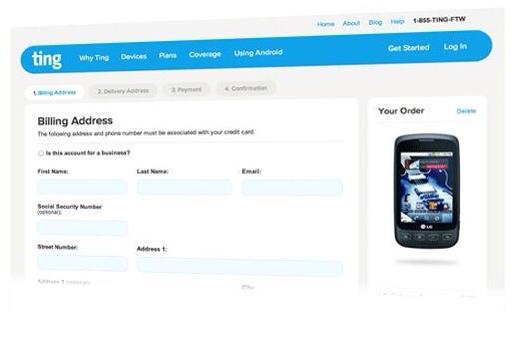RIM is now saying that chip problems have delayed the first next-generation BlackBerry phones until last 2012–almost six years after the iPhone was announced. PaidContent’s Tom Krazit has a good, angry post on the news and the company’s generally sad condition.
Tag Archives | Smartphones
Rumor: Android’s Answer to Siri is Coming Soon

Siri, the virtual assistant built into Apple’s iPhone 4S, seemed to catch competitors off guard. But all along, Google has reportedly been working on its own voice-controlled assistant for Android phones that responds to natural language.
The project is apparently codenamed Majel, and may see an initial release by the end of this year, Android and Me reports, based on unnamed sources. The codename is a reference to the Federation Computer in Star Trek, whose full name is voiced by Majel Barrett-Roddenberry.
No comments
Zite’s Personalized Magazine App Comes to the iPhone

It’s been a busy week for mobile applications that mimic the feel of a magazine, but with content from an array of sources. First, iPad hit Flipboard arrived on the iPhone. Then Google unveiled Currents, an iOS and Android app which basically answers the question “What if Google had invented Flipboard?”
Now Zite, another iPad mainstay, is joining Flipboard on the iPhone. The company recently gave me a sneak peek and a bit of hands-on time with the app.
Continue Reading →
No comments
Flipboard for the iPhone: Cool…and Unavailable

[UPDATE: Flipboard is working for me; the company says that folks with existing accounts should be able to get in, but it’s temporarily stopped registering new users.]
When Flipboard debuted for the iPad last year, it got so much attention that the company’s servers buckled under the load and the app didn’t work. And now, it’s deja vu all over again: After arriving in an excellent iPhone version yesterday evening, Flipboard has gone down. I’m getting the above on a freshly-installed copy of the iPhone version; on the iPad, the app is behaving oddly, sometimes going to the wrong section when I swipe.
Outages of this sort are almost a rite of passage for impressive new services. They generally bounce back pretty quickly, which leaves me wondering: If it’s so easy to add adequate capacity after the fact, why does it seem so tough to have it in the first place?
No comments
First Look Flipboard Lands on the iPhone, Winningly

When social-magazine app Flipboard debuted on the iPad in July of last year, it instantly became the closest thing yet to a defining app for Apple’s new program–a beautifully-done program that was beautifully tailored to the platform’s strengths. It was hard to imagine it running on any other device.
 Starting now, you don’t need to try and imagine what it might be like elsewhere: Flipboard is arriving on the iPhone. It should be available on the App Store around the time this post goes live.
Starting now, you don’t need to try and imagine what it might be like elsewhere: Flipboard is arriving on the iPhone. It should be available on the App Store around the time this post goes live.
No comments
Verizon: Not Blocking, Conversing
Verizon Wireless says it isn’t blocking Google Wallet on its version of the Galaxy Nexus. Then again, it also doesn’t seem to be permitting it…
No comments
Verizon Galaxy Nexus Isn’t Pure Google, May Cost $300
 The Galaxy Nexus is a pure Google phone, free of bloatware and designed to run Android exactly as Google envisions it. But on Verizon Wireless, that won’t be the case.
The Galaxy Nexus is a pure Google phone, free of bloatware and designed to run Android exactly as Google envisions it. But on Verizon Wireless, that won’t be the case.
Although the Verizon Galaxy Nexus will run a mostly unmodified version of Android 4.0, codenamed Ice Cream Sandwich, the carrier will block Google Wallet, which lets you pay at some retailers by swiping your phone in front of a payment terminal, Computerworld reports. Verizon, T-Mobile and AT&T are working on their own payment system called Isis, and Google Wallet, backed by Sprint, would be a threat. Isis isn’t launching until next year, though, so Verizon Galaxy Nexus users won’t be able to use NFC payments at all.
No comments
Siri: Insanely Unfinished
 Good rant by Gizmodo’s Mat Honan on the iPhone 4S’s Siri, a rare Apple product that’s being used as a major selling point even though it’s unquestionably unfinished. Me, I like Siri even in its current state–but Apple needs to follow up with a version that feels less like a beta and more like an Apple product.
Good rant by Gizmodo’s Mat Honan on the iPhone 4S’s Siri, a rare Apple product that’s being used as a major selling point even though it’s unquestionably unfinished. Me, I like Siri even in its current state–but Apple needs to follow up with a version that feels less like a beta and more like an Apple product.
No comments
Ting: A Wireless Carrier that Isn’t Your Enemy
While most wireless carriers take every opportunity to overcharge their customers, Ting wants to be different.
The carrier, which according to CNet will launch in mid-2012, automatically sorts users into appropriate price tiers for wireless voice, data and text. So if you don’t use your phone a lot in a given month, you land in lower tiers and don’t get charged as much. In months of heavy use, Ting bumps you up to higher tiers instead of charging inflated overage fees.
Of course, there are catches: Ting subscribers must buy their own phones at full price, off-contract. While that means customers are free to leave Ting at any time, the up-front cost is more expensive. But because Ting’s service plans are generally cheaper than those of major wireless carriers, and because subscribers pay less for light use, the savings can add up in the long run. Also, Ting customers must activate their own phones, which can be a complicated process, especially when porting a number from another carrier.
The other downside to Ting’s service is that if you only exceed your usage limit by a tiny amount, you pay for a higher tier instead of a small overage fee. For this reason, the wireless industry has tried to argue that overage fees are great for consumers, but the savings you’d reap from falling into a cheaper tier for lower usage negates that argument.
As for service, Ting will run on Sprint’s network. It’s not clear whether Ting will offer 4G service at launch.
Ting is one of several carriers that are trying to undercut major wireless providers on the cost of smartphone service. Others include Republic Wireless, which costs $19 per month and relies on Wi-Fi to drive network usage down, and Sprint’s own Virgin Mobile brand, whose plans start at $35 per month. T-Mobile has also jumped in with $30 per month prepaid service in partnership with Walmart.
The problem with all of these services is that their best phones are inferior to the top shelf offerings from AT&T, Verizon Wireless, Sprint and T-Mobile. (CNet’s Rafe Needleman said he doesn’t like Ting’s selection, and hopes it gets better before the service launches.) But even low-end smartphones are improving, so these cheap carriers are becoming viable alternatives.
[This post republished from Techland.]
No comments
More on Carrier IQ
Security researcher Dan Rosenberg says that most of the hubbub over Carrier IQ is overblown–but there’s still reason to be concerned.
Based on my research, CarrierIQ implements a potentially valuable service designed to help improve user experience on cellular networks. However, I want to make it clear that just because I do not see any evidence of evil intentions does not mean that what’s happening here is necessarily right. I believe the following points need to be addressed. Note that most of the burden in this situation falls not on CarrierIQ but on the handset manufacturers and carriers, who are ultimately responsible for both collecting this information and establishing service agreements with consumers.

